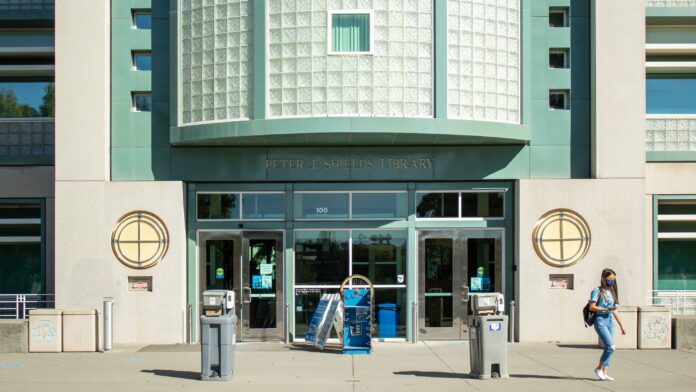The letter asks the administration to offer fully asynchronous courses, solutions for inconsistent internet access on and off campus
The Grad Student Association (GSA) teamed up with the leadership from ASUCD to craft a letter aimed at addressing inequity intensified by remote learning during the pandemic.
“I think at first we thought about it like, ‘How are grad students going to benefit from this?’” said Jonathan Minnick, the president of the GSA. “But, we all also had the idea that a rising tide lifts all boats.”
The letter advocates for improving students’ access to the internet, citing a lack of reliable connection both on and off campus.
Gwen Chodur, the external vice president of GSA, said the issue hits home to her because she too has experienced difficulties with her internet connection as a teaching assistant (TA).
“I was in the middle of a meeting, it went off just after nine and didn’t come back until five,” Chodur said. “It was an entire day-long outage.”
Minnick said that one way to address the lack of reliable internet off-campus is to provide personal hotspots following in the footsteps of a program offered by UC Berkeley.
“There is always this underlying assumption that everyone has internet access,” he said. “I think that we learned very quickly that that’s simply not true.”
Renetta Tull, the vice chancellor of diversity, equity and inclusion, said in her experience, there were students who relied on on-campus internet as an effective student resource.
“I’ve had the opportunity to speak with a couple of students that said that they’ve actually come from different areas where they didn’t have internet at home,” Tull said. “They came to campus because they knew the WiFi would be better.”
Although some students may come to campus to utilize the WiFi, UC Davis has had connectivity issues in the past with the campus WiFi Eduroam, and students may be living far from campus without the ability to travel on the weekdays for stable internet. The major issue with providing access to hotspots is knowing who needs them, which the university has tried to resolve with multiple surveys about needs, said Maria Martinez, the external vice president of ASUCD and co-signer of the letter.
“I think we definitely have the funding to do so, at least in the tech department of the university,” Martinez said.
The letter requests fully asynchronous lectures and discussions for every course through Canvas. ASUCD President Kyle Krueger said connectivity has caused concerns for international students who are juggling different time zones.
“There wasn’t time to put together a fully asynchronous program with all the faculty and all the classes, knowing that there are thousands of classes and professors covering many of those classes,” Tull said. “There wasn’t time to do that for the Fall Quarter, but my understanding is that the provost and the senate are looking into it and taking the concerns very seriously.”
Provost and Executive Vice Chancellor Mary Croughan said in an email that she was unavailable to be interviewed in time for publication.
“I don’t usually like to jump straight to memos or resolutions, so I did email some members of the Academic Senate, just in a more conversational context originally,” Krueger said. “Overall, there needs to be a little more of a push to get the students’ voices heard in this particular area.”
Some of the students who are coming to campus are having their first remote college class this quarter, Minnick said.
“I think it would be quite unfair to expect them to try to thrive in this situation,” Minnick said. “We have to take a lot of grace for ourselves; we have to take a lot of grace for our students.”
Universal closed captioning was requested by the ASUCD leadership and GSA intended to assist students with disabilities who are navigating fully remote courses without standardized procedures in place.
The concerns detailed in the letter have existed long before the pandemic, but have been heightened due to the remote quarter, Chodur said.
“This is the drum that I will beat about COVID,” she said. “All of these issues existed beforehand, they’ve just been magnified by what is happening now.”
The extension of pass/no pass and drop deadlines are also highlighted in the letter, which Martinez said should be made available until all students return to campus after the pandemic is over.
“I think that getting an ‘A’ last Fall Quarter and getting an ‘A’ now are completely different circumstances,” Martinez said. “If students don’t have the resources to get those letter grades, it becomes kind of an incomparable task.”
Written by: Kathleen Quinn — campus@theaggie.org




